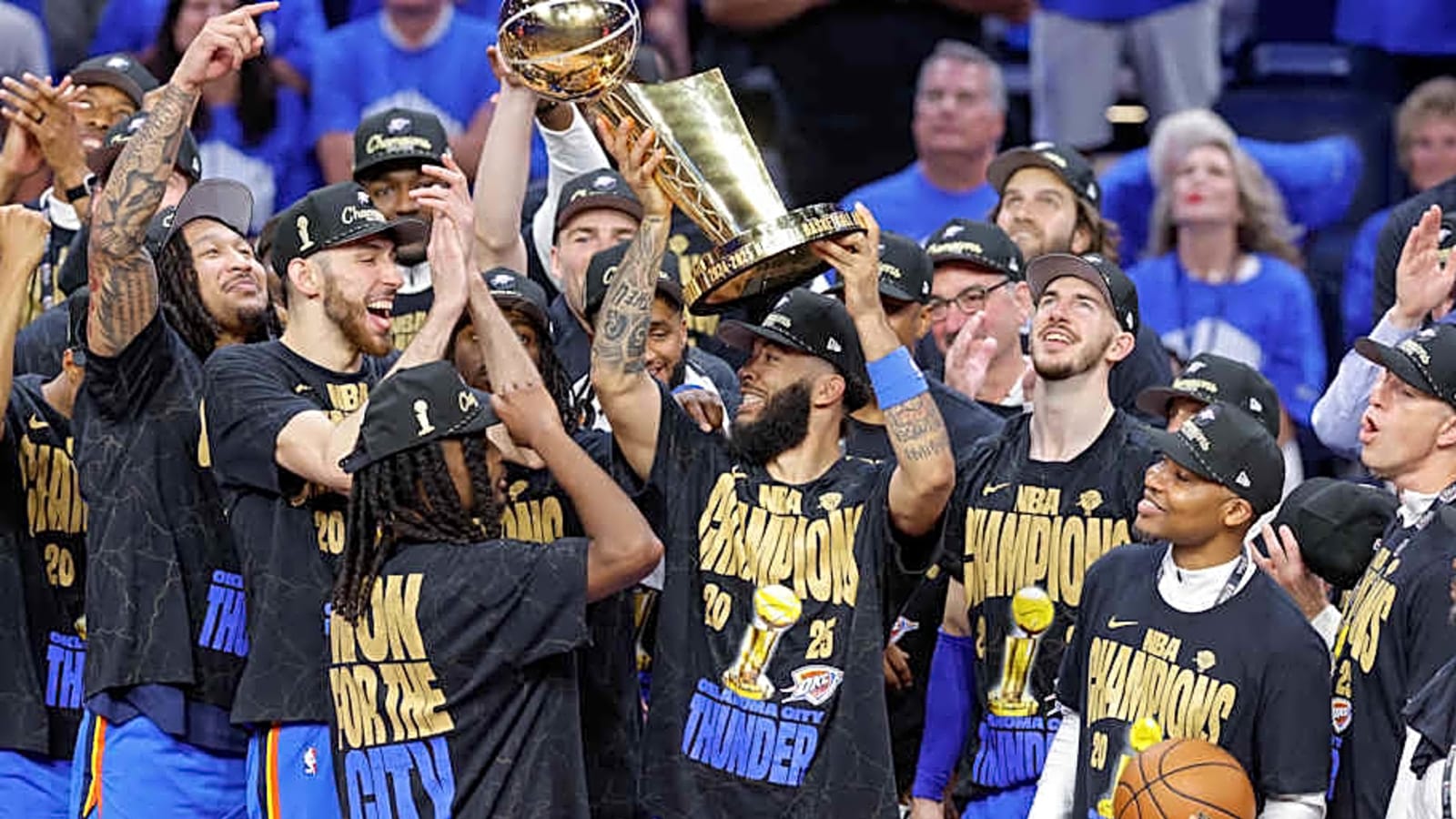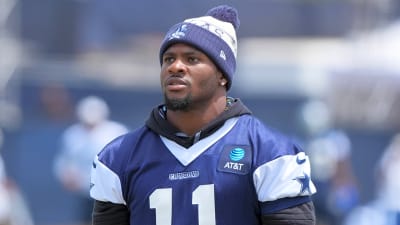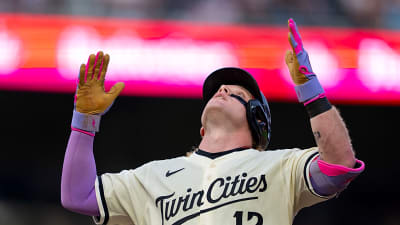
Kenrich Williams graduated from TCU in 2018 as one of the most accomplished basketball players in program history.
Williams earned All-Big 12 honors as a junior and senior, scored over 1,000 points (1,125), and ranks fourth in program history for rebounds (877). He also helped the Horned Frogs win an NIT championship in 2017 and make the NCAA tournament in 2018, the program’s first tournament bid since 1998.
Last month, Williams added another accomplishment to his resume - NBA champion.
Williams won the title with the Oklahoma City Thunder. He’s the second Horned Frog and the first since 1994 (Scott Brooks, Houston Rockets) to win an NBA title.
During the playoffs, Williams played in 16 games, averaging 8.6 minutes, 2.4 points, and 2.2 rebounds per game. He joined the Thunder via a trade in 2020 after spending two seasons with New Orleans. New Orleans signed Williams in 2018 as an undrafted free agent.
“It's a blessing just to be in the position to be able to compete for a championship, be on a good team like the Thunder and just have the opportunity to play with the group of guys that I play with,” Williams said during a recent visit to TCU. “I'm never going to find a better team than that.”
Williams, aka “Kenny Hustle,” talked with TCU On SI about becoming an NBA champion, playing for Oklahoma City, his career so far, and his lasting impact on TCU basketball. The interview has been edited for clarity and length.
Kenrich WIlliams Discusses Becoming an NBA Champion
About a month has passed since winning the NBA championship. What was that experience like, and how does it feel now that some time has passed?
When you're in the finals and you're going through the playoffs, it's a lot of different emotions, a lot of stress. I have to admit, a lot of stress. You're like, ‘Okay, what's going to happen?’ And you can't think like that. Our coach uses the phrase of 'just be where your feet are.' That's just staying present. So that's what I tried to do. But now that the finals are over, I'm able to enjoy it with my family and friends.
OKC head coach Mark Daignault described the team as “uncommon.” Why do you think he picked that word?
Yeah, that's the word he uses a lot. He loves that word. But you know, being uncommon is like, we're the youngest team. That's an uncommon thing. We're the hardest playing team. That's an uncommon thing. We all have good character guys, which is uncommon. We enjoy being around each other. That's uncommon. A lot of stuff goes into being an uncommon team. But he uses it very well, and it's very motivational for us, especially when we're playing.
You are one of two players on OKC’s roster who are 30 years old or older. (The team's average age was 25.6 this season.) What is it like playing with teammates who are younger than you and/or relatively new to the league?
It's refreshing. You come in, and these guys are hip to the culture. They're young, they're on social media. They call me ‘unc’ for the team, which is like, I'm 30, so it's crazy. But it's refreshing being around them 'cause they're vibrant. They keep the room light. There's a lot of laughter, a lot of jokes going on. But the main thing that I noticed about the group of guys and them being young is they know when to turn it on, when to turn it off. We're going through shoot around, everybody's locked in. We're in the locker room, everybody's joking around. So it's a good mixture of both.
During the Finals, Coach Deignault praised your leadership. How do you gain the trust of players who are younger than you and have a different perspective?
I think just experience; me using my wisdom. This is about to be my eighth year, so everything that those guys have been through, I've pretty much been through. The highs and lows of the NBA: getting traded, signing a deal, playing, and not playing. I've been through everything, and that's my job, I feel, as a leader for the team, to be able to share my experiences with the team and with guys who go through stuff. So I'm really comfortable with the guys. They trust me.
Your teammate Shai Gilgeous Alexander (SGA) was named league MVP this season. What is he like as a player and person?
He's legit, he's the real deal. Everything that you guys see on TV and interviews and stuff, he's legit. He's always the first one in the gym, working super hard. His work ethic, it reminds me a lot of (former TCU teammate) Desmond Bane. And after practice, he's staying in the gym. We'll come in late at night. He has a kid. I have my kids. We bring the kids in.
Outside of basketball, he's probably the most humble guy that I've been around who has stature the way he does, like MVP, Finals MVP. He's humble, like to where he'll give his shirt off his back, that type of humble. And I think that that kind of rubs off on the team, and the team kind of gravitates towards him.
When you first got into the NBA, what struggles did you face? Were there any times when you thought this just wouldn’t work?
As a basketball player, I bet you 90% of players that goes through your mind, I mean, unless you're like LeBron James or Michael Jordan. But that definitely went through my mind. Those first two years in New Orleans were tough for me just having to adjust to the NBA lifestyle, the travel, confidence level. It's a lot of stuff that goes into playing in the NBA and being successful in the NBA. Those first two years were definitely learning experiences for myself. It just felt like in year three when I got traded to OKC, everything started to click. I started to figure out what it meant to be a pro, what it meant to play in the NBA. But I'm definitely grateful for those experiences 'cause they helped build where I'm at now.
At TCU, you helped the Horned Frogs win an NIT title, which seemed to shift the program’s trajectory. Looking back and seeing the program’s success since (tournament appearances in 2022, 2023, 2024), what does that mean to you, knowing the NIT year sort of set the stage?
It didn't really set in until last year, whenever I got my jersey retired here, like, dang, man, I really feel like a pioneer for TCU basketball and the growth that it's made over the years. I actually kind of patted myself on the back in a way. But I'm just super grateful to be able to come here and have the opportunity to change the narrative and change the whole program. And I wouldn't be able to do it without my teammates, who I had with me at the time, like BP (Brandon Parrish), Desmond, (Chris) Washburn, and coach Jamie Dixon and all the coaching staff who gave me the opportunity to be who I am today.
You mentioned the jersey retirement ceremony. Was that something you ever could have imagined happening when you were playing?
You don't even think of those things when you're playing; you're just so caught up in the competition. You're caught up in just trying to be the best that you can be. Those things, like, okay, maybe I have a chance, but let me just focus on what I can control. And when coach Dixon called me and told me they were gonna retire my jersey, I was just super happy and more for myself and my family as well. My last name's gonna forever be up there in the rafters. So, it was definitely like a sense of, man, I feel accomplished, like I did my purpose at TCU.
What advice do you give TCU basketball players who want to make it in the league?
The main advice is you gotta work hard. It's not just practice. You gotta come here after practice. You gotta come here before practice, put the work in. That's my main thing. And the second thing I would say is have faith, trust in God, and believe in yourself. You have a 70-80% advantage over everybody else if you truly believe in what you can bring to the table.
How has being a husband and father to three daughters (ages 5, 2, and 1) changed your perspective while playing in the NBA?
It definitely helped me focus on what's important in life. This game of basketball is temporary; being a father that's a lifetime thing. Being able to watch my kids grow up, it's so precious to see. And then another thing is, it gives me a sense of peace. I come home from a game, and my daughters, they run up to me. I could get home at like 12, they're running up to me, excited to see me after a game or when I get off the road, happy to see me. So it kind of makes me happy, and it makes me understand what's important, and I know my purpose now. Being a dad is more important than the game of basketball.
More must-reads:
- Luka Doncic makes massive move regarding future with Lakers
- Lakers just did Luka Doncic a $417 million favor
- The 'NBA Summer League MVPs' quiz
Breaking News
Trending News
Customize Your Newsletter
 +
+
Get the latest news and rumors, customized to your favorite sports and teams. Emailed daily. Always free!








